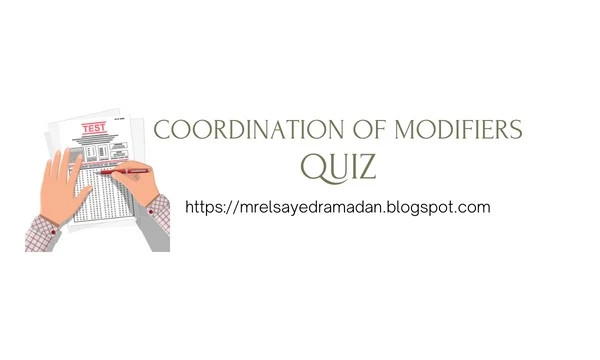Coordination of Modifiers Quiz
Standardized tests such as the ACT, Digital SAT, and the EST are crucial for determining college and job readiness. A key component of these tests is the English section, which often includes questions on grammar and sentence structure. One important aspect of sentence structure is the coordination of modifiers, which refers to the proper placement and usage of adjectives and adverbs in a sentence. In this blog post, we will explore the concept of coordination of modifiers and how it is tested on standardized tests such as the ACT, Digital SAT, and EST. We will also provide a quiz to help students practice identifying and correcting errors in the coordination of modifiers. By understanding and mastering the coordination of modifiers, students can improve their scores on these important standardized tests.
1/8
Although emotionally drained, Martha’s creative instinct compelled her to keep writing.
NO CHANGE
it was her creative instinct that compelled Martha
Martha was compelled by her creative instinct
her creative instinct compelled Martha
Explanation: The subject of the participle drained is Martha, not her instinct. (Just ask: who was drained?) Therefore, choices A, B, and D are incorrect because they include dangling participles. The only option with the correct subject is choice C.
2/8
Even with a sprained ankle, the coach forced Adam to go back into the game.
NO CHANGE
Even though Adam had a sprained angle, the coach forced him
The coach, even with a sprained ankle, forced Adam
Adam was forced by the coach, even with a sprained ankle,
Explanation: The prepositional phrase with a sprained ankle modifies Adam, not the coach, so choice A is incorrect because it contains a dangling modifier. Choice B corrects this problem by using a dependent clause with a clear subject, verb, and object. Choices C and D are incorrect because neither clarifies who has the sprained ankle.
3/8
Lacking any real sailing skills, David’s primary concern was keeping the boat upright.
NO CHANGE
David had the primary concern of
it was David’s primary concern to
David was primarily concerned with
Explanation: The subject of the participle lacking is David. (Who lacked any real sailing skills?) Therefore, choices A and C contain dangling participles. Choice B is incorrect because the phrase had the primary concern is unidiomatic and unclear.
4/8
We found the long-lost manuscript searching through a box of old letters in the attic.
NO CHANGE
Searching through a box of old letters in the attic, we found the long-lost manuscript.
We found the long-lost manuscript in the attic searching through a box of old letters.
In the attic, we found the long-lost manuscript searching through a box of old letters.
Explanation: What was searching through a box of old letters? We were. By the Law of Proximity, the modifying phrase should be as close to its subject—the word that it modifies—as possible, as in choice B. Choices A, C, and D are all incorrect because each implies that the manuscript was searching through the box of old letters.
5/8
To get a good jump out of the blocks, sprinters say that proper hip positioning is essential.
NO CHANGE
For getting a good jump out of the blocks, sprinters say that proper hip positioning is essential.
Sprinters say it is essential for getting a good jump out of the blocks for hip positioning to be proper.
Sprinters say that proper hip positioning is essential for getting a good jump out of the blocks.
Explanation: Choice A is incorrect because the (infinitive) noun phrase To get a good jump out of the blocks does not play any grammatical role in the main clause. Choice B is incorrect because the prepositional phrase for getting a good jump out of the blocks is too far away from the adjective it modifies, essential. Choice C is incorrect because the prepositional phrase for hip positioning to be proper does not logically modify any part of the main clause. Choice D is best because it places the prepositional phrase next to the adjective it modifies.
6/8
Although unhappy with the angry tone of the debate, the senator’s plan was to remain calm and rational and to stick to her central policy issues.
NO CHANGE
the senator planned
it was the senator’s plan
the plan was for the senator
Explanation: The adjective unhappy describes the senator, not her plan, so choice A is illogical. Choices C and D likewise have illogical subjects. Only choice B uses a subject that corrects for the dangling modifier.
7/8
After searching for months for the perfect rug, we finally found one at a garage sale.
NO CHANGE
as then we finally found one
one finally appeared
one was finally found by us
Explanation: The original phrasing is best because it contains a clause that coordinates logically with the participial phrase that starts the sentence. Choice B is incorrect because then is redundant. Choices C and D are incorrect because they both allow the participial phrase to dangle.
8/8
Although famous for its visual and performing arts scene, Portland’s musical culture is also a source of local pride.
NO CHANGE
famous for Portland’s visual and performing arts scene, its
Portland, being famous for its visual and performing arts scene, its
Portland is famous for its visual and performing arts scene, its
Explanation: Choice A is incorrect because the adjective phrase that starts the sentence does not logically modify the subject of the sentence: a musical culture can’t be famous for its visual and performing arts scene. Choice B is incorrect because its lacks a logical antecedent. Choice C is incorrect because the sentence is not grammatical after the interrupting modifier has been trimmed. Choice D is best because it coordinates the two ideas logically and grammatically.

